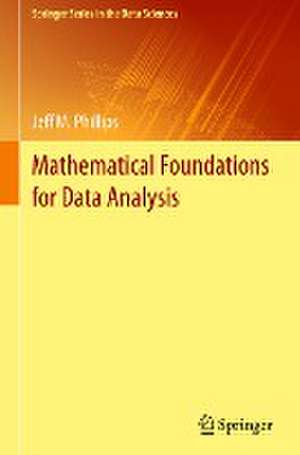Mathematical Foundations for Data Analysis: Springer Series in the Data Sciences
Autor Jeff M. Phillipsen Limba Engleză Hardback – 30 mar 2021
| Toate formatele și edițiile | Preț | Express |
|---|---|---|
| Paperback (1) | 422.11 lei 6-8 săpt. | |
| Springer International Publishing – 31 mar 2022 | 422.11 lei 6-8 săpt. | |
| Hardback (1) | 400.43 lei 3-5 săpt. | +33.14 lei 6-12 zile |
| Springer International Publishing – 30 mar 2021 | 400.43 lei 3-5 săpt. | +33.14 lei 6-12 zile |
Preț: 400.43 lei
Nou
Puncte Express: 601
Preț estimativ în valută:
76.62€ • 81.94$ • 63.89£
76.62€ • 81.94$ • 63.89£
Carte disponibilă
Livrare economică 28 martie-11 aprilie
Livrare express 13-19 martie pentru 43.13 lei
Preluare comenzi: 021 569.72.76
Specificații
ISBN-13: 9783030623401
ISBN-10: 3030623408
Pagini: 287
Ilustrații: XVII, 287 p. 109 illus., 108 illus. in color.
Dimensiuni: 155 x 235 x 27 mm
Greutate: 0.64 kg
Ediția:1st ed. 2021
Editura: Springer International Publishing
Colecția Springer
Seria Springer Series in the Data Sciences
Locul publicării:Cham, Switzerland
ISBN-10: 3030623408
Pagini: 287
Ilustrații: XVII, 287 p. 109 illus., 108 illus. in color.
Dimensiuni: 155 x 235 x 27 mm
Greutate: 0.64 kg
Ediția:1st ed. 2021
Editura: Springer International Publishing
Colecția Springer
Seria Springer Series in the Data Sciences
Locul publicării:Cham, Switzerland
Cuprins
Probability review.- Convergence and sampling.- Linear algebra review.- Distances and nearest neighbors.- Linear Regression.- Gradient descent.- Dimensionality reduction.- Clustering.- Classification.- Graph structured data.- Big data and sketching.
Recenzii
“This is certainly a timely book with large potential impact and appeal. … the book is therewith accessible to a broad scientific audience including undergraduate students. … Mathematical Foundations for Data Analysis provides a comprehensive exploration of the mathematics relevant to modern data science topics, with a target audience that is looking for an intuitive and accessible presentation rather than a deep dive into mathematical intricacies.” (Aretha L. Teckentrup, SIAM Review, Vol. 65 (1), March, 2023)
“The book is fairly compact, but a lot of information is presented in those pages. … the book is pretty much self-contained, but prior knowledge of linear algebra and python programming would benefit anyone. The clear writing is backed in many instances by helpful illustrations. Color is used judiciously throughout the text to help differentiate between objects and highlight items of interest. … Phillips’ book is much more concise, but still discusses many different mathematical aspects of data science.” (David R. Gurney, MAA Reviews, September 5, 2021)
Notă biografică
Jeff M. Phillips is an Associate Professor in the School of Computing within the University of Utah. He directs the Utah Center for Data Science as well as the Data Science curriculum within the School of Computing. His research is on algorithms for big data analytics, a domain with spans machine learning, computational geometry, data mining, algorithms, and databases, and his work regularly appears in top venues in each of these fields. He focuses on a geometric interpretation of problems, striving for simple, geometric, and intuitive techniques with provable guarantees and solve important challenges in data science. His research is supported by numerous NSF awards including an NSF Career Award.
Textul de pe ultima copertă
This textbook, suitable for an early undergraduate up to a graduate course, provides an overview of many basic principles and techniques needed for modern data analysis. In particular, this book was designed and written as preparation for students planning to take rigorous Machine Learning and Data Mining courses. It introduces key conceptual tools necessary for data analysis, including concentration of measure and PAC bounds, cross validation, gradient descent, and principal component analysis. It also surveys basic techniques in supervised (regression and classification) and unsupervised learning (dimensionality reduction and clustering) through an accessible, simplified presentation. Students are recommended to have some background in calculus, probability, and linear algebra. Some familiarity with programming and algorithms is useful to understand advanced topics on computational techniques.
Caracteristici
Provides accessible, simplified introduction to core mathematical language and concepts Integrates examples of key concepts through geometric illustrations and Python coding Addresses topics in locality sensitive hashing, graph-structured data, and big data processing as well as basic linear algebra Includes perspectives on ethics in data










